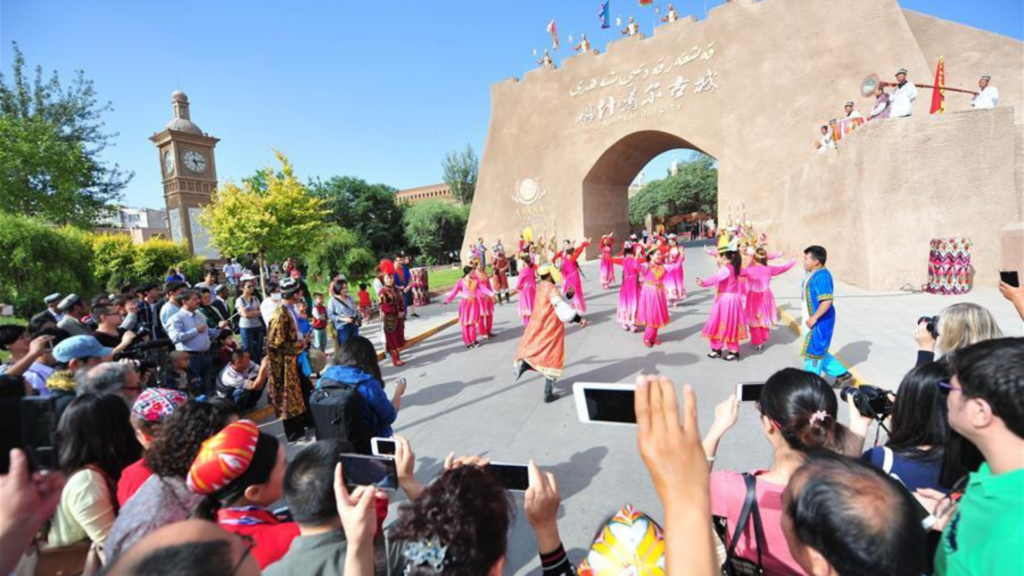State Department MOU Recognizes China’s Ownership and Control Over Uyghur and Tibetan Cultural Heritage

October 24, 2023
A UHRP Insights column by Peter K. Tompa
Uyghurs and Tibetans have seen the People’s Republic of China (PRC) purposefully destroy their cultural heritage in an effort to create the false narrative that the Han were always the dominant culture throughout what is now China. This “cultural cleansing” has included demolishing historic and cultural sites, persecuting Uyghur and Tibetan religious authorities, and banning and burning religious and cultural texts.1See Committee for Cultural Policy and Global Heritage Alliance, 2023 China MOU Report (May 26, 2023), online (last visited October 23, 2023).
While parts of the U.S. State Department have condemned the PRC’s actions, the Bureau of Educational and Cultural Affairs (ECA) and its Cultural Heritage Center view advocates for Uyghurs and Tibetans as obstacles to renewing its Cultural Property Memorandum of Understanding (MOU) with the PRC. The U.S. State Department entered into its first MOU with China in 2009, despite significant opposition from domestic U.S. interests, including those advocating on behalf of Tibet. Ironically, this was a year after the PRC began its systemic demolition of Kashgar Old City.2Henryk Szadziewski, Kashgar’s old city: the politics of demolition, Open Democracy (April 3, 2009), online (last visited October 23, 2023).
MOUs have become increasingly important diplomatic tools for ECA. MOUs originally were focused narrowly on protecting significant cultural artifacts for poorly funded countries which had difficulty grappling with the problem themselves. Over time, however, mission creep has repurposed and vastly expanded the program to repatriate most everything and anything made in a given country from prehistory to the early 20th century to an ever-increasing number of countries of origin. The current MOU with the PRC must be renewed before January 10, 2024, or it will lapse.
The concerns advocates for Uyghurs and Tibetans have with this MOU and its associated import restrictions are twofold. First, it recognizes the rights of the PRC to exercise ownership and control over the cultural heritage of these dispossessed populations. Second, associated import restrictions authorize U.S. Customs and Border Protection (CBP) to detain, seize and repatriate cultural goods of types on ever expanding “designated lists.” These import restrictions already cover Uyghur and Tibetan archaeological artifacts, and there is always the danger that restrictions will be extended to additional categories of more recent ethnological objects.
Advocates for Uyghur and Tibetan minorities instead believe that such material should be explicitly excluded from import restrictions and/or that any materials that are seized should be awarded to representatives of these communities and not to the PRC, which is responsible for the destruction of so much Uyghur and Tibetan cultural heritage.
These concerns are not unique. Other recent MOUs with Middle Eastern and North African (MENA) countries have also impacted the cultural heritage of displaced Jewish and Christian minority populations.
Unfortunately, human rights advocates face bureaucratic opposition within ECA to the view that authoritarian national governments are not the best stewards for the cultural heritage of their discriminated against or displaced minority populations. America’s own fundamental respect for human rights demands much more.
Peter K. Tompa is a semi-retired lawyer who resides in Washington, D.C. He has written extensively about cultural heritage issues, particularly those of interest to the numismatic trade. Peter contributed to “Who Owns the Past?” (K. Fitz Gibbon, ed. Rutgers 2005). He formerly served as executive director of the Global Heritage Alliance and now is a member of its board of directors. This article is a public resource for general information and opinion about cultural property issues and is not intended to be a source for legal advice.
Read more:
Testimony of Peter Irwin for Consideration by the Cultural Property Advisory Committee, June 5, 2023
Testimony of Louisa Greve for Consideration by the Cultural Property Advisory Committee, June 5, 2023
Submission for Consideration by the U.S. Department of State Cultural Property Advisory Committee, May 26, 2023
